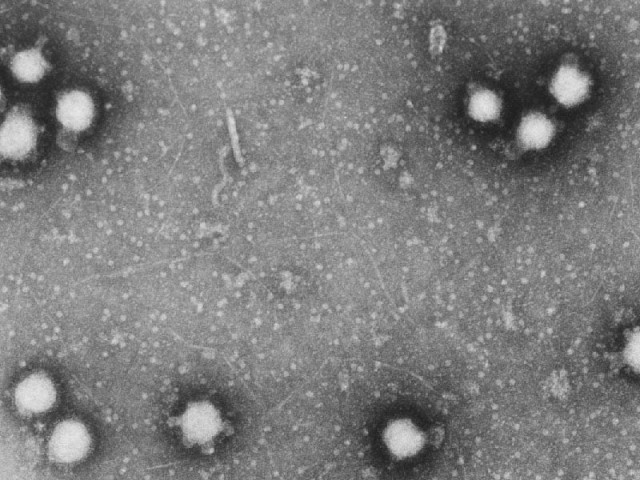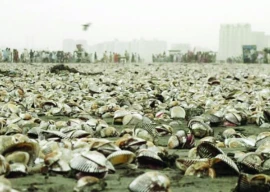
At least 2,000 houses surrounding the house of a man who died due to the Congo virus on Thursday are being surveyed to check for possible threats of the virus being present in the area.
Muhammad Kashif was a 24-year-old butcher and a resident of Azizabad who contracted the virus and passed away at a private hospital.
This is the first reported case of the Congo virus in the province this year and it has forced the Karachi Metropolitan Corporation (KMC) to initiate an epidemiologic and demographic survey to gather details of the area the patient resided in.
"The survey is underway and will be finalised within two days," said the senior director of Medical and Health Services at KMC, Dr Salma Kausar Ali. "This is a precautionary measure. We want to check if anyone else in the area has fever or other symptoms of the virus." She added that the survey was quite technical and was being conducted for the first time in the city. According to Ali, they will distribute a pro forma in the city as part of the surveying process.
Several departments and officials have held meetings in the last couple of days to deal with the Congo virus. Dr Ali told The Express Tribune that a public awareness campaign will be launched next week. She added that in the last five years, one or two cases of the virus usually surface in the city before Eid. Karachi Commissioner Shoaib Ahmed Siddiqui will be holding a meeting on Tuesday (today) where KMC officials might disclose the survey's findings. District and health officials are on high alert to take precautionary measures before Eidul Azha after the first Congo virus case surfaced in the city.
Around one million animals are slaughtered during the three days of Eidul Azha and according to Deputy Commissioner Central Dr Syed Saifur Rehman, more than 300,000 animals will be slaughtered just in his district.
"We are on high alert. We have asked the stakeholders to take precautionary measures and follow the instructions issued by the authorities," he said after presiding over the 'Control of Congo Crimean Fever' meeting at his office on Monday.
He said that right now all areas of the city are considered to be risky but areas such as New Karachi, Liaquatabad and Gurlberg are high-risk.
The meeting which was attended by the assistant commissioners, officials of the livestock department, taluka health officers, cattle farmers associations, meat association and others went on for over three hours where they discussed issues created after the Congo virus was detected.
"Prevention is possible rather than treatment," Dr Rehman told those present at the meeting. He added that it was imperative for butchers and cattle farms to follow instructions on what extra measures they have to take.
Butchers at slaughterhouses have been asked to wear a required dress code and use gloves when handling meat. It was also suggested that butchers wear pastel coloured clothes so it is easy to spot the tick carrying the virus. The full list of instructions will be made available after the meeting with the commissioner of Karachi. Monitoring committees will be supervising these activities on a regular basis.
Veterinary doctors and officials of the provincial livestock department have been asked to look into the matter and take precautionary measures.
In 2012, three people infected by the Congo virus died in Karachi. All three victims used to work with livestock.
Symptoms
The Congo virus or Crimean Congo Viral Heamorrhagic Fever is a tick-borne viral disease that can spread from domestic and wild animals. Initial signs and symptoms include headache, fever, back and joint pain, vomiting and red eyes. Many people who get infected also get jaundice and as the illness progresses, large areas of severe bruising, severe nosebleeds, and uncontrolled bleeding at injection sites can be seen, beginning on about the fourth day of illness and lasting for about two weeks.
Published in The Express Tribune, August 26th, 2014.


















COMMENTS
Comments are moderated and generally will be posted if they are on-topic and not abusive.
For more information, please see our Comments FAQ